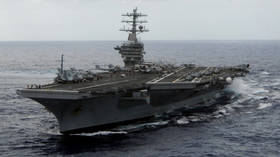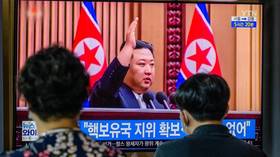US nuclear-powered warship leads military drills

The US Navy has kicked off joint military drills with South Korea and Japan, with a US nuclear-powered aircraft carrier taking a lead role in anti-submarine exercises designed to counter the DPRK.
The South Korean Defense Ministry announced the latest wargames on Monday, noting the three nations would hold two days of “anti-submarine warfare training” near Seoul's southern island of Jeju.
“This exercise will be a good opportunity to improve the maritime operational capabilities of [South] Korea, the US and Japan to respond to underwater threats such as North Korea's [submarine-launched ballistic missiles], which are advancing in sophistication,” said Brigadier General Kim In-ho, the commander of the South Korean forces taking part in the drill. “We will neutralize any form of provocation by responding overwhelmingly and decisively.”
The ministry said the exercises would be led by Rear Admiral Christopher Sweeney, commander of the US’ 11th carrier strike group, which includes the nuclear-powered aircraft carrier USS Nimitz, multiple guided-missile destroyers, and other support vessels. A Japanese destroyer and South Korean fast combat support ships were also slated to join the drills, which will also involve “search-and-rescue training.”
The Nimitz carrier strike group took part in a separate bilateral exercise with Seoul in late March, its first joint drill with the South Korean Navy during its current deployment. Sweeney offered few details about the training, but declared that the US and South Korea are committed to “deterring aggression on the Korean Peninsula” and that their partnership has “never been stronger.”
Though Pyongyang has yet to comment on the exercises, it has repeatedly condemned similar operations as preparation for an attack on North Korea, as Washington and Seoul have held several rounds of wargames in recent months.
In March, the two countries conducted their largest round of joint drills in five years, which saw 11 days of exercises on land, air, and sea, prompting a retaliatory weapon test from the DPRK.
The North has carried out a flurry of missile launches over the last year in response to the wargames, reaching a record number in 2022, and recently vowed to expand its nuclear arsenal to combat threats from adversaries.
Asked about the three-way submarine training on Monday, China’s Foreign Ministry said “continuous military drills” are the “main reason behind the recent flaring tensions on the Korean Peninsula,” urging the US and its allies to “stop military pressuring” and to pursue dialogue with North Korea.













